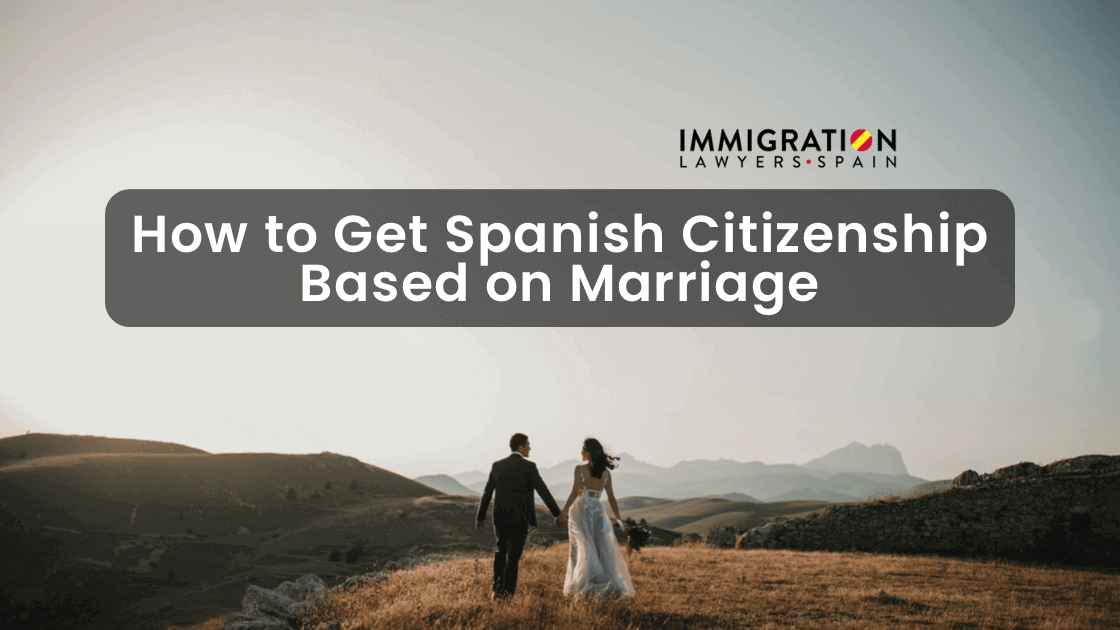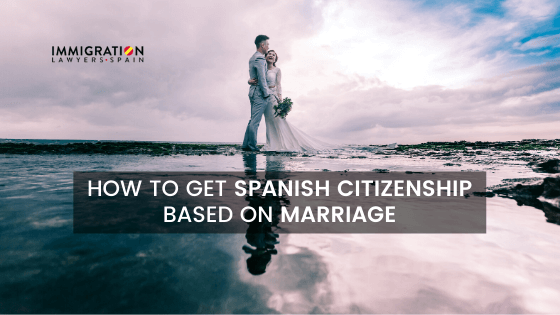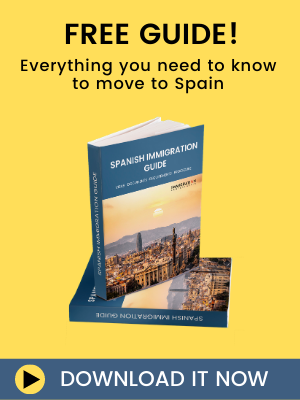
So, you’re a non-European marrying a Spanish citizen, can you now apply for Spanish citizenship by marriage? In the general sense, the answer is yes.
But, the biggest detail to remember is that marrying a national does not automatically give you Spanish nationality. There are steps to follow and a process to carry out; which we will explain in this article!
Don’t worry – although obtaining citizenship is not instantaneous, there are benefits to marrying a Spanish national, such as having the fastest procedure time towards citizenship in Spain.
Are you ready to learn about it? Let’s go.
Content
ToggleDo you get citizenship if you marry someone from Spain?
You can get citizenship after marrying someone from Spain, but it does not happen automatically.
While this was possible many years ago, it no longer is.
Today, there is no such thing as instantly attaining Spanish citizenship by marriage. In other words, you don’t get Spanish nationality just by simply marrying a Spanish citizen.
You see, from the 50s to the mid-70s, if you married a Spanish citizen, you could directly acquire the nationality from your partner. However, in 1975, the Spanish civil code (see Article 22) was modified. From then on, the situation changed completely. It became impossible to get nationality directly after marriage.
But don’t panic.
Marriage is one of the steps that will greatly accelerate the attainment of citizenship. It will help you immensely, (which we have already explored in our article about the main advantages of marriages between Spanish nationals and foreigners).
It won’t be as easy as it was in the past, but it is still possible. And in this article, we will show you how.
Let’s study that in more detail.
Benefits of Marrying a Spanish Citizen
Marrying a Spanish citizen simplifies and speeds up the process of obtaining Spanish nationality. This applies not only to citizenship but also to the residency requirement, which is a key step before applying.
One of the biggest advantages of Spanish nationality by marriage is that you only need to live in Spain for one year before applying. This is a significant reduction compared to the usual 10-year requirement for most foreigners, or the 2-year rule for citizens of Latin American countries, Andorra, the Philippines, Equatorial Guinea, Portugal, or Sephardic Jews.
For comparison:
- If you are in a civil union or pareja de hecho instead of being married, you would not qualify for the reduced residency period. In that case, you would likely need to wait 10 years before applying for nationality.
- The same applies if you are a non-EU citizen married to a non-Spanish EU citizen living in Spain. In this situation, marriage alone does not grant access to Spanish nationality.
A key consideration is that Spain generally does not allow dual nationality, meaning you may have to renounce your original citizenship. However, exceptions exist for citizens from former Spanish colonies and some other specific cases.
- Travel freely to 183 countries using the Spanish passport
- Right to live and work anywhere in the European Union.
- Full political rights in Spain, including voting in elections.
But before enjoying these benefits, what does the whole process look like?
How to obtain Spanish Citizenship via Marriage Step-by-step
The procedure is quite straightforward, and works as follows:
1.Register your marriage
First, the foreign citizen who wants to obtain nationality must register the marriage with the Spanish national, something that is done at the notary.
2. Find the right residency option
After the marriage is officially registered, the next step is obtaining residence.
Being married to a Spaniard allows you to obtain citizenship in just 1 year (much less time), but you must still live in the country during those 12 months.
And that requires obtaining residency.
But, again, thanks to having married a Spanish national, the process is easier.
Here you have 2 different options:
- Obtain residency through the Family Member of an EU citizen card (tarjeta comunitaria)
- Do it under family arraigo
The main difference between the two is that for tarjeta comunitaria you are in a regular situation, and need to prove sufficient economic means; for Family Arraigo, you are in an irregular situation and do not need to prove sufficient economic means, but need to provide clear criminal records for the last 5 years
Both are great options, as they grant 5-year cards. This means that you will have enough time under both to submit your citizenship application and obtain your positive resolution (which can take 1 or 2 years) without the need to renew your permit.
3. Apply for residency
Once you have defined what would be the required residence permit in your particular situation, it’s time to gather and prepare all documents.
Submit them to the immigration office, and after 3-5 months of waiting time, you will receive your physical residency card, with which you will be allowed to live and work in Spain for 5 years.
4. Stay in Spain for 1 year
After obtaining residency, the foreigner must demonstrate continued coexistence with their spouse for a year in the Spanish territory. Only afterwards will they be eligible to file for Spanish nationality.
It is important to note, however, that the required one year residency time period only begins once you are granted the residence permit, not once you start living with your spouse.
That means that even if you may have been married to a Spanish citizen, and living with them, for a longer period of time before the residency, it doesn’t count. The important thing (that is, the requirement that will be examined) is that you have lived together for at least one year in the Spanish territory, while you had your residence permit.
Thus, we are talking about a nationality by residency procedure. Not nationality by marriage.
5. Apply for citizenship
Finally, after that year as a legal resident in Spain, you will be able to submit your citizenship application.
Bear in mind that you must pass 2 spanish nationality tests: the language test (Spanish A2), and the CCSE exam (sociocultural test).
To summarize, you must marry a Spanish national, apply for one year residency, then apply for citizenship while demonstrating having lived with your spouse for one year.
In the bigger scheme of things, especially marriage, the one-year requirement is a very short amount of time, and a great advantage. In the next section we will better understand what happens before, during, and after this one year.
Do you have doubts? Get personalized advice from one of our immigration lawyers:
How long is the processing time to get citizenship in Spain by marriage?
After the one-year residency period, the processing time to get citizenship in Spain by marriage takes approximately 1 to 2 years.
It is important to note that the process for obtaining citizenship is legally 1 year, but because of delays or complications, this could be extended up to 2 or even 3 years.
However, as we have seen, the administrative litigation can expedite the process noticeably. Then, you would be able to get a positive response in a few months.
But let’s backtrack a little bit. In terms of your projected timeframe, it will also be important to consider when you get married.
That is because, depending on the region of Spain you live in, it can take months after the marriage registration is submitted for the marriage to be made official. You must go to a notary, and have it officially recognized at the public registry.
Then, you must apply for Spanish residency, which will last for one year, as this is essentially a citizenship by residence procedure.
Documents & requirements for spanish nationality through marriage
Generally speaking, the requirements and documents for this process are exactly the same as those required for the rest of the people who apply for nationality by residence. Without exception.
Thus, the Ministry of Justice will be the institution in charge of evaluating if you meet the necessary requirements to become Spanish and thus obtain your DNI.
However, because this is built on the fact of marriage, of course you will also be required to submit documents that validate your union.
The requirements and necessary documents to apply for citizenship by marriage include:
- Have a residence permit as a family member of an EU citizen. This card must be valid during the legal application period, very important
- Demonstrate the possession of sufficient economic means. In this case, it will be about 150% of the IPREM, which is €900 per month
- Certificates that prove the passing of the CCSE and DELE exams
- Full passport
- Birth certificate of both the spouse and the principal applicant
- Criminal background check for the last 5 years in Spain and any other country you have resided in
- Census. Both members of the marriage must be jointly registered in the town hall (this is called “empadronamiento”). This will be the method of checking the continued coexistence for a year
- Marriage certificate. Keep in mind that if the marriage was registered outside the country, it must be registered in Spain before beginning the legal application procedure
- It cannot be a civil union (“pareja de hecho”) or a divorced couple. The reduction to a single year would not be applicable in those cases. This is one of the main differences between marriage and civil union in which the first option is more recommended
- Integration with the Spanish culture
- DNI of the Spanish citizen
Remember that all foreign documents must have legal validity in Spain. If you want to know the procedure behind that, here you will find a guide on how to legalize or apostille foreign documents.
Which exams do I have to take to get nationality by marriage?
To get nationality by marriage, you must take and pass the same exams as for any other citizenship application by residency:
- Take and pass the CCSE exam, which is a cultural test.
- You must take and pass the DELE A2, which is a basic language test. Both exams are carried out by the Cervantes Institute.
If you have heard that some situations exempt you from taking these exams, it is true, there are exemptions. For example, if you are from a Latin American country that speaks Spanish, you do not have to take the DELE A2.
Plus, there are three situations that would exempt you from taking both exams. These are: (1) not being able to read or write, (2) having learning disabilities, (3) having been enrolled in and completing compulsory secondary education (ESO) in Spain.
For these three situations, you must request for a waiver (dispensa) from the Ministry of Justice. You can read more about these exemptions here.
Can I still apply for Spanish citizenship if my Spanish spouse is deceased?
Yes, you can still apply for Spanish citizenship if your Spanish spouse is deceased.
You will just have to also submit the death certificate of your deceased spouse and a registered certificate of historical coexistence.
Getting the Spanish Passport by Marriage
As you have seen, falling in love with and marrying a Spanish national doesn’t have to be complicated, and can have a happy ending! Citizenship is the goal for many foreigners, and marriage can be a great path to obtain spanish nationality, passport and residence.
We hope that this article has helped you understand the whole process of applying for Spanish passport through residency in the context of marriage.
If you still have any more questions or need help with the legal application process to get this citizenship by marriage in the Spanish territory, let our immigration lawyers help you:
Get in touch with our lawyers and let us guide you step by step:






10 Replies to “Spanish Citizenship by Marriage”
I do not understand what you mean with “I’m a spanish citizen but I don’t have spanish nationality yet”. You can only be Spanish citizen if you have the citizenship.
If you want to invest in Spain in order to get a residence permit the investment must reach the 500.000€.
I’m a spanish citizen but I don’t have spanish nationality yet. Can i buy a property here without having a job contract so my pakistani spouse could obtain Spain residency? Also if I can buy a property, how much do i need to invest in order for my spouse to be able to obtain Spain’s residency?
About the purchase, please note you need a NIE number in Spain in order to do the transaction.
Related to your residence permit, it is not clear yet what will happen with Brexit. However, if you want to spend most of the year in Spain the best would be to get a residence permit as EU citizen before the Brexit.
Please send us your consultation to info@balcellsgroup.com so one of our lawyers can contact you.
I am a British citizen by birth and have been married to a Spanish citizen by birth for 25 years. We live in England but want to buy a property in catalunya with the intention of spending most of the year there. How can l achieve this after Brexit?
Yes, you can do it as long as you are divorced.
Can a divorced person get citizenship of Spain by marrying with a Spanish person ?
IT simply means that once you register marriage, it can take a while until it is fully legally registered, and you should also take that time into account.
Hola Rosario,
¡Mándanos un mail a info@immigrationspain.es y te ayudaremos!
what do u mean by this sentence ?may u give examples?
That is because, in fact, depending on the region of Spain in which you live, it can take months after the registration is filed after its submission.
sii quiro ayuda porfavor.. para tener nationalidad española ,,estoy casada con español y vivo en españa en 11 años. gracias..